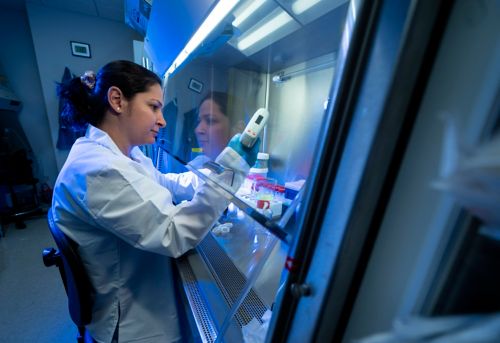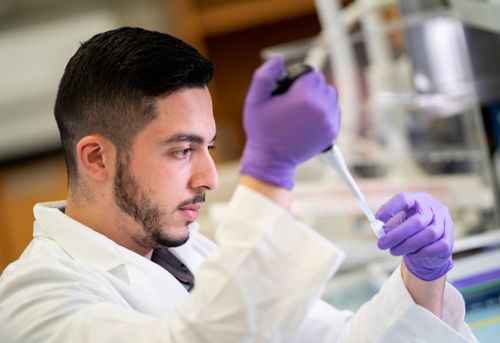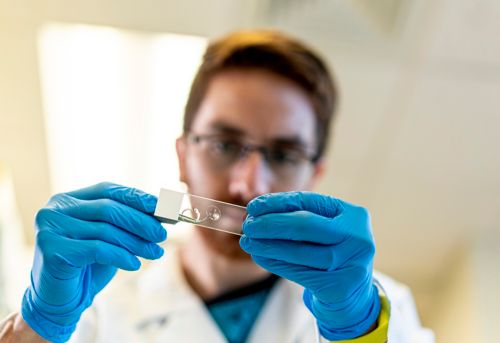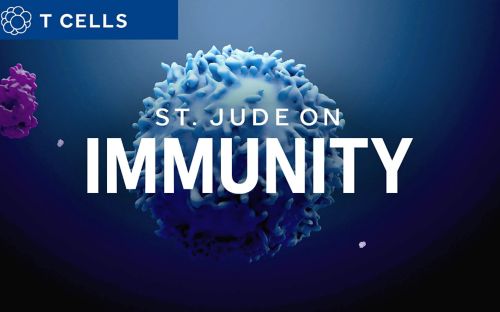St. Jude Family of Websites
Explore our cutting edge research, world-class patient care, career opportunities and more.
St. Jude Children's Research Hospital Home

- Fundraising
St. Jude Family of Websites
Explore our cutting edge research, world-class patient care, career opportunities and more.
St. Jude Children's Research Hospital Home

- Fundraising
Krenciute Lab
Developing CAR-modified T cells as an effective and safe therapy for childhood brain tumors
About the Krenciute Lab
Pediatric brain tumors, and their immune microenvironment, present an incredible clinical challenge. Immunotherapy has been explored as a treatment approach, but better specificity and function of antitumor T cells is necessary. The Krenciute laboratory focuses on establishing safe and effective T-cell based therapies for pediatric brain tumors. We also study the brain tumor microenvironment, mechanisms of tumor resistance, and the genetic landscape of tumors and the immune system. Our goal is to enhance the persistence, efficacy, and safety of antigen-specific T cell therapies for clinical applications.

Our research summary
Our lab is focused on engineering pediatric brain tumor-specific T cells and understanding T cell regulation to improve immunotherapeutic approaches for patient populations. By reeducating the immune system, we hope to improve tumor detection along with the persistence, efficacy, and safety of immune effector cells. Chimeric antigen receptor (CAR) T cells enable targeting of specific and unique tumor associated antigens. Our laboratory leverages expertise in CAR T design and production with collaborative partnerships in neuro-oncology, epigenetics, and immunology across, and beyond, St. Jude.
Designing CAR T cells for pediatric brain tumors
Our lab has long been interested in identifying the antigen signatures of pediatric brain tumors to guide the development of CAR T cells. We set out to determine the unique landscape of these tumors and identify differences from the adult disease. Our experiments have defined a hierarchy of tumor specific antigens quite distinct from adults, for which we have engineered and evaluated specific CAR T cells. We use in vitro and in vivo techniques to determine the efficacy of these CAR Ts, creating small iterations in signaling domains to optimize function. We are still exploring possible candidates, and plan to incorporate large scale screening and -omics based approaches to further define the landscape of tumor associated antigens. Much of this work is conducted in close collaboration with the pediatric brain tumor experts Drs. Martine Roussel and Suzy Baker.

Improving T cell functionality, persistence, and safety
We also apply genetic manipulations to optimize CAR T cells, with a particular focus on negative regulators of immune cell function. By knocking out these negative regulators, and investigating the resulting biology, we can improve T cell anti-tumor activity and persistence. In many cases, we know what regulators, genetic or epigenetic, control T cell function, and so we work to explore the mechanisms by which they impact CAR T cell biology and activity.
Understanding the resulting CAR T cell phenotypes, genetic and epigenetic signatures will lead to additional lines of investigation as we work to optimize CAR T cell functionality. Much of this work is conducted in close collaboration with Dr. Ben Youngblood, an expert on T cell epigenetics, and other principal investigators in the Department of Immunology.

Understanding interactions between CAR T cells and brain tumors
In the course of our work, we observed that engineered CAR T cells were not always effective at irradicating a tumor despite robust expression of a particular antigen. As a result, our lab has started exploring the interactions between CAR T cells, tumor cells and the tumor microenvironment. We are interested in determining whether physical properties of the tumor, or immune landscape of the surrounding environment, impact CAR T cell function.
To accomplish robust interrogation of CAR T cell function and efficacy, our lab leverages several technologies and approaches. We have developed in vitro repeat stimulation assays that recapitulate in vivo settings to explore T cell expansion, persistance and killing. We then use multiplex analysis of cytokine secretion to define patterns that might predict persistence. Whole genome, RNA and bisulfide sequencing allow us to explore the genetic and epigenetic landscapes associated with CAR T cell modifications and functional activity. Additionally, we partner with the Center for In Vivo Imaging and Therapeutics to evaluate the preclinical efficacy of CAR T cells in orthotopic mouse models of pediatric brain tumors.
Learn more
Immunity in the spotlight: how vaccinations and the immune system protect us
Researchers at St. Jude explain what immunity is and how it works.
Selected Publications
Contact us
Giedre Krenciute, PhD
Assistant Member
Bone Marrow Transplant and Cellular Therapy
MS 310, Room I4104
St. Jude Children's Research Hospital
Follow Us

Memphis, TN, 38105-3678 USA GET DIRECTIONS

